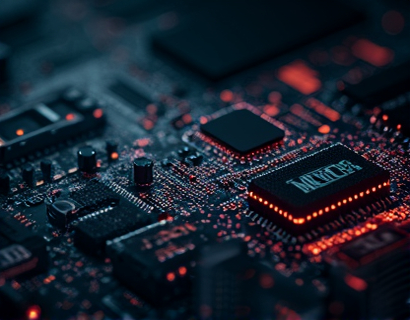Personalized AI-Driven Math Education for Kids and Young Learners: Transforming Learning and Building Future STEM Leaders
In the rapidly evolving landscape of education, the integration of Artificial Intelligence (AI) has opened new avenues for personalized learning experiences, particularly in subjects like mathematics which are foundational for future STEM careers. For children and young learners aged 5 to 18, AI-driven personalized math education represents a transformative shift from traditional teaching methods to interactive, engaging, and adaptive learning environments. This approach not only enhances mathematical skills but also builds confidence and fosters a deep-seated passion for math and STEM fields.
Understanding Personalized AI-Driven Math Education
Personalized AI-driven math education leverages advanced algorithms and machine learning to tailor the learning experience to each student's unique needs, abilities, and learning pace. Unlike conventional classrooms where a one-size-fits-all approach often prevails, AI can identify individual strengths and weaknesses, providing customized content and exercises that address specific areas requiring improvement. This personalized touch ensures that every student receives the support they need to succeed, regardless of their starting point.
The Role of Interactive Problem-Solving
One of the key features of AI-driven math education is the emphasis on interactive problem-solving. Traditional math lessons often involve passive learning, with students listening to lectures and completing worksheets. In contrast, AI-powered platforms engage students through interactive problems, games, and simulations that make learning dynamic and fun. These interactive elements not only capture students' attention but also encourage active participation, critical thinking, and creativity in solving mathematical challenges.
Engaging Resources and Multimedia Content
To further enhance the learning experience, AI-driven math education incorporates a variety of engaging resources and multimedia content. Videos, animations, and interactive diagrams help visualize complex concepts, making them more accessible and easier to understand. For instance, a lesson on fractions can be brought to life through animated segments showing fractions in real-world scenarios, such as dividing a pizza or a cake. This multimedia approach caters to different learning styles, ensuring that visual, auditory, and kinesthetic learners all benefit from the educational content.
Building Confidence and Fostering a Love for Math
Confidence is a crucial factor in a student's academic journey, especially in subjects like math where fear and anxiety can be significant barriers. AI-driven personalized math education plays a pivotal role in building confidence by providing immediate feedback and recognizing achievements, no matter how small. As students progress through the platform, they receive positive reinforcement, which boosts their self-esteem and motivates them to tackle more challenging problems. Over time, this positive reinforcement helps foster a genuine love for math, transforming it from a daunting subject into an area of interest and enjoyment.
Improving Academic Performance
The personalized and interactive nature of AI-driven math education directly contributes to improved academic performance. By addressing individual learning gaps and providing targeted support, students can close knowledge gaps more efficiently. The adaptive learning algorithms continuously monitor progress, adjusting the difficulty level of problems to ensure that students are always challenged but not overwhelmed. This balanced approach not only enhances understanding but also promotes retention of mathematical concepts, leading to better grades and overall academic success.
Preparing for Future STEM Careers
As the demand for STEM professionals continues to grow, early exposure to math and science is essential for preparing the next generation of innovators and leaders. AI-driven personalized math education lays a strong foundation in mathematical skills, which are critical for success in fields such as engineering, computer science, and data analysis. By nurturing a deep understanding of math from a young age, students are better equipped to pursue higher education and careers in STEM, contributing to technological advancements and societal progress.
The Impact on Educators
The shift towards AI-driven personalized math education also has significant implications for educators. Teachers can leverage these platforms to gain valuable insights into each student's learning patterns and progress. This data-driven approach allows educators to identify areas where students struggle and intervene with targeted support, enhancing their teaching effectiveness. Additionally, AI can automate administrative tasks, freeing up more time for teachers to focus on fostering a supportive and engaging classroom environment.
Challenges and Considerations
While the benefits of AI-driven personalized math education are clear, there are also challenges and considerations to address. Ensuring equitable access to technology and high-speed internet is crucial to prevent a digital divide that could exacerbate existing educational inequalities. Moreover, maintaining data privacy and security is paramount, as sensitive student information must be protected. Educators and policymakers must work together to develop guidelines and best practices that maximize the benefits of AI while mitigating potential risks.
The Future of Math Education
As AI technology continues to advance, the future of math education looks promising. The integration of AI with other emerging technologies, such as virtual reality (VR) and augmented reality (AR), could further revolutionize the learning experience. Imagine students exploring complex mathematical concepts in immersive VR environments or collaborating on AR projects that bring abstract ideas to life. The potential for innovation is vast, and the focus on personalized learning will continue to shape the way we teach and learn math.
Conclusion
Personalized AI-driven math education represents a significant leap forward in how we approach learning mathematics. By providing tailored experiences, interactive problem-solving, and engaging resources, these platforms empower students to build confidence, improve academic performance, and develop a lifelong passion for math and STEM. As we move forward, it is essential to address the challenges and ensure that all students have the opportunity to benefit from these transformative educational tools. The future of math education is bright, and AI is at the forefront of this exciting journey.










































